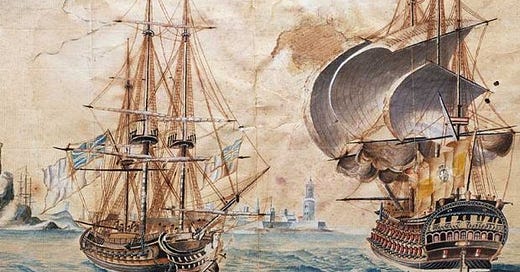In the last few years, among the myriad post-war myths that the online right has assailed, perhaps none has come under such direct and furious assault as the oft-spoken line that America is an idea. No less than the recently ousted Speaker of the House Kevin McCarthy took occasion to repeat this dogma, as if divining the increasing rate of its dispute. Or perhaps he just really believes it, and we’re merely flattering ourselves.
Nonetheless, conservative consensus on this question is unmistakably cracking. What has been called the “blank slate” becomes a more absurd assertion by the day, and even the Jewish Lobby itself has begun to question the idea that you can bring just anyone here to “become American.” The data and, far more importantly, the zeitgeist demand a nativist correction.
And yet, as many of the Americans in this scene are reminded to our consternation, our nation is not a blood-and-soil Völkisch state that just suddenly turned heel. America has had its atheists, its synagogues, and its slaves from the beginning. Many eager foreigners and doom merchants point to these things as proof that our doom was baked into the cake, so to speak. Many Americans, too, unable to reconcile the history of European Nationalist movements with their own patrimony, have despaired or believed these naysayers.
But America is not a land of blank slate-ism, either. Our operating system, rather, is what Dr. Nick Land has termed “English Maritime Liberalism” in his article “The Open Spiral.”1 A century ago we would have called it the “Frontier Thesis” (more on this later).
In essence, we understand that while the Anglo peoples are “inclusive” or “open,” this is preconditioned on a critical component that the post-war prosperity and ideological contagions stripped out — there was a very real risk to running with the English-speaking peoples. Maritime Liberalism was born of perhaps the most intense geostrategic arms race before our modern age, where the upstart Protestant powers went to war for all the chips in the game. The age of exploration and colonialism was just barely underway, and it was the seas that would decide if the Holy League would triumph or if the ascendant Crown under whose banner Drake, Raleigh, and Smith all fought would chart a new course. Under this same banner (often little better than a black flag) Protestants from all over Europe would fight. Dutchmen, Huguenots, and other Continental peoples were absorbed into the Open Spiral in the duel for geopolitical supremacy. That they were not Anglos mattered not, for they willingly subjected themselves to the vortex that would make them Anglos.
And in the case of America, it was only more so. Our core was secured, having largely arrived before the end of the English Civil War, let alone the Revolution. Into this crucible of the vast, untamed frontier, men flocked to win a patrimony and demonstrate that they too were white men of good character. It was this process Frederick Jackson Turner had in mind when he wrote:
The frontier is the outer edge of the wave — the meeting-point between savagery and civilization… the line of most rapid and effective Americanization. The wilderness masters the colonist.2
English Maritime Liberalism thus required no dogmatic blood quantum, and could suffer plenty of elasticity and opacity without any serious danger to itself. So long as the crucible existed, the saints and sinners sucked into its vortex needed no second glance — if they endured and excelled, they would be unmistakably marked as Anglo-Colonists.
This is a critical distinction for us as our situation in America continues to deteriorate and the bones of our patrimony start to show. Scripture wisely cautions, “But avoid foolish questions, and genealogies, and contentions, and strivings about the law; for they are unprofitable and vain.”3 Instead, we know our countrymen “by their fruits,” to borrow yet more from Scripture. In the American epic Moby Dick, it is said:
Our souls are like those orphans whose unwedded mothers die in bearing them: the secret of our paternity lies in their grave, and we must there to learn it.
The Blank Slate is thus alien to the English Canon, and to America. The crucible reveals our elect, and now as ever, it is they who shall determine our future.
1 Nick Land, “The Open Spiral,” Compact, March 8, 2023
2 The Significance of the Frontier in American History [1893]
3 Titus 3:9 (KJV)




Very nicely put. Going back further in history, there is the thesis that the Anglos are descended from a self-selected substrata of the wider German population - marauding young men whose spirit of adventure carried them over the sea to plunder and conquer the British Isles.
This explains differences between Anglos and Germans, and also the origins of the common law system, as these warbands were bonded by contractual loyalty to a chief and to one another, rather than being bound to blood and soil or a specific tribal lord. From here we get to modern British and American jurisprudence, the mercenary spirit of mercantile capitalism and even the modern liberal refusal to ever get into pure ethnic politics. That's certainly how a lot of 20th century German thinkers saw the Anglos.
Neat read, that Open Spiral